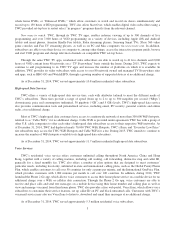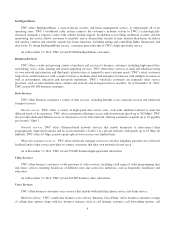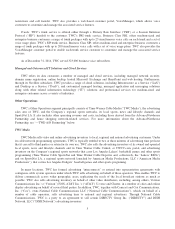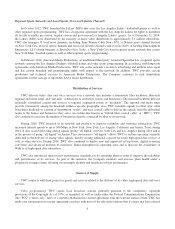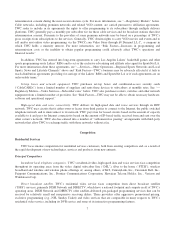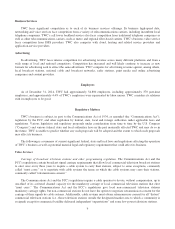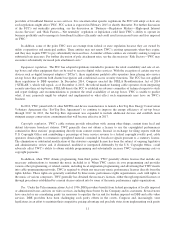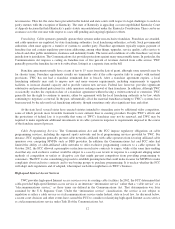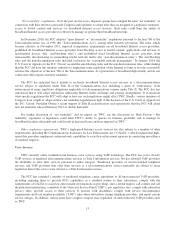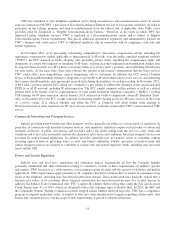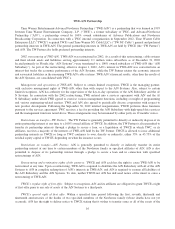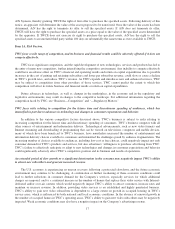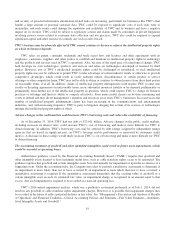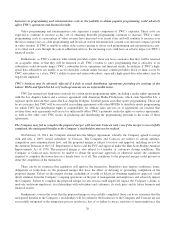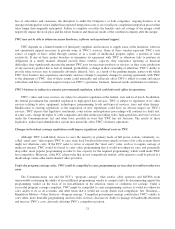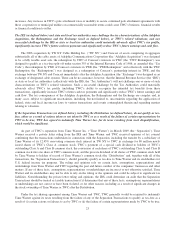Time Warner Cable 2014 Annual Report Download - page 21
Download and view the complete annual report
Please find page 21 of the 2014 Time Warner Cable annual report below. You can navigate through the pages in the report by either clicking on the pages listed below, or by using the keyword search tool below to find specific information within the annual report.“Net neutrality” regulations. Over the past several years, disparate groups have adopted the term “net neutrality” in
connection with their efforts to persuade Congress and regulators to adopt rules that are designed to safeguard consumers’
access to lawful content and services via broadband Internet access services. Such rules could limit the ability of
broadband Internet access providers to effectively manage or operate their broadband networks.
In December 2010, the FCC adopted “open Internet” or “net neutrality” regulations pursuant to Section 706 of the
Telecommunications Act of 1996 (the “Telecommunications Act”), among other statutory provisions. The rules, which
became effective in November 2011, imposed transparency requirements on all broadband Internet access providers,
prohibited all broadband Internet access providers from blocking access to lawful content, applications and services or
non-harmful devices (the “anti-blocking rules”), and prohibited fixed broadband Internet access providers from
unreasonably discriminating in transmitting lawful network traffic (the “non-discrimination rules”). The anti-blocking
rules and the non-discrimination rules included exclusions for “reasonable network management.” In January 2014, the
U.S. Court of Appeals for the D.C. Circuit vacated the anti-blocking rules and the non-discrimination rules, while finding
that the FCC did have the statutory authority to implement some regulation of the Internet so long as its rules reasonably
advance the objectives of Section 706 of the Telecommunications Act (promotion of broadband deployment) and do not
contravene other express statutory mandates.
The FCC has indicated that it intends to reclassify broadband Internet access services as a telecommunications
service subject to regulation under Title II of the Communications Act, including a grant of “forbearance” from
enforcement of many regulatory obligations applicable to telecommunications carriers under Title II. The FCC also has
announced that it will adopt regulations addressing Internet traffic exchange and peering arrangements. It is uncertain
what specific regulations the FCC will adopt or how any such regulations might affect TWC. Finally, various members of
Congress have sought to adopt statutory net neutrality legislation in light of the decision of the U.S. Court of Appeals for
the D.C. Circuit, President Obama’s recent support of Title II reclassification and expectations that the FCC will adopt
new net neutrality rules in February 2015 or shortly thereafter.
For further discussion of “net neutrality” and its impact on TWC, see the discussion in “Risk Factors—‘Net
neutrality’ regulation or legislation could limit TWC’s ability to operate its business profitably and to manage its
broadband facilities efficiently and could result in increased taxes and fees imposed on TWC.”
Other regulatory requirements. TWC’s high-speed Internet access services are also subject to a number of other
requirements, including the Communications Assistance for Law Enforcement Act (“CALEA”), which requires that high-
speed data providers implement certain network capabilities to assist law enforcement agencies in conducting surveillance
of criminal suspects.
Voice Services
TWC currently offers residential and business voice services using VoIP technology. The FCC has yet to classify
VoIP services as regulated telecommunications services or Title I information services, but has afforded VoIP providers
the flexibility to offer their services pursuant to either category. Traditional providers of circuit-switched telephone
services and VoIP providers that offer their services as a telecommunications service generally are subject to more
regulation than if the service were offered as a Title I information service.
The FCC has extended a number of traditional telephone carrier regulations to all interconnected VoIP providers,
including requiring them to: provide E911 capabilities as a standard feature to their subscribers; comply with the
requirements of CALEA to assist law enforcement investigations in providing, after a lawful request, call content and call
identification information; contribute to the Universal Service Fund (“USF”); pay regulatory fees; comply with subscriber
privacy rules; provide access to their services to persons with disabilities; comply with service discontinuance
requirements and local number portability (“LNP”) rules when subscribers change telephone providers, and report certain
service outages. In addition, certain states have sought to impose state regulation on interconnected VoIP providers such
as TWC.
13


